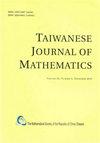$\Gamma_1(4)$上半积分权模形式泰勒系数的$p$-adic性质
IF 0.6
4区 数学
Q3 MATHEMATICS
引用次数: 0
摘要
对于素数p lect 3(mod 4)和m≥2,Romik提出了一个问题,即经典Jacobiθ函数θ3的√−1附近的Taylor系数是否最终模p m消失。这个问题可以推广到Γ1(4)和CM点上半积分权的一类模形式;本文证明了素数p≥5的一个有效答案。我们的结果也是Larson和Smith关于SL 2(Z)上积分权的模形式的结果的推广。本文章由计算机程序翻译,如有差异,请以英文原文为准。
$p$-adic Properties for Taylor Coefficients of Half-integral Weight Modular Forms on $\Gamma_1(4)$
. For a prime p ≡ 3 (mod 4) and m ≥ 2, Romik raised a question about whether the Taylor coefficients around √− 1 of the classical Jacobi theta function θ 3 eventually vanish modulo p m . This question can be extended to a class of modular forms of half-integral weight on Γ 1 (4) and CM points; in this paper, we prove an affirmative answer to it for primes p ≥ 5. Our result is also a generalization of the results of Larson and Smith for modular forms of integral weight on SL 2 ( Z ).
求助全文
通过发布文献求助,成功后即可免费获取论文全文。
去求助
来源期刊
CiteScore
1.10
自引率
0.00%
发文量
35
审稿时长
3 months
期刊介绍:
The Taiwanese Journal of Mathematics, published by the Mathematical Society of the Republic of China (Taiwan), is a continuation of the former Chinese Journal of Mathematics (1973-1996). It aims to publish original research papers and survey articles in all areas of mathematics. It will also occasionally publish proceedings of conferences co-organized by the Society. The purpose is to reflect the progress of the mathematical research in Taiwan and, by providing an international forum, to stimulate its further developments. The journal appears bimonthly each year beginning from 2008.

 求助内容:
求助内容: 应助结果提醒方式:
应助结果提醒方式:


